Turkey sells 200 tons of secret gold to Iran
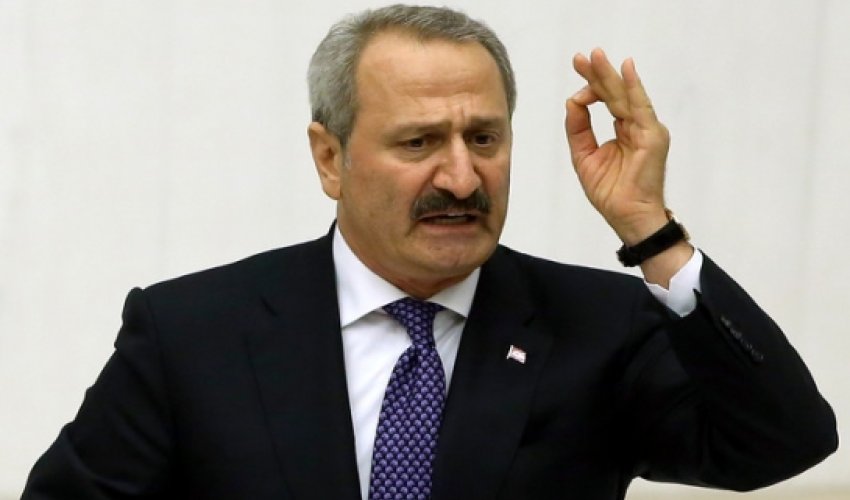
As the minister in charge of Turkey’s $800 billion economy in 2013, Zafer Caglayan was facing a series of numbers that didn’t bode well for coming elections. Inflation was up, growth was slowing and the lira was weakening.
One key measure of financial health was particularly worrisome: the country was importing far more goods, services and capital than it was sending abroad. By October, when he was interviewed by a local CNBC affiliate, Caglayan described the gap as unsustainable and said the government would take steps to improve it.
What he didn’t mention was a clandestine export-boosting operation started up more than a year before that was helping to solve the trade imbalance.
At the time of the television appearance, it was still underway. Three weeks before, Caglayan had been secretly taped by national-police investigators telling his collaborators to find a way to increase exports by at least $1 billion a month. His orders came from the top in a two-hour meeting with Prime Minister Recep Tayyip Erdogan, he told an associate.
The operation featured an Iranian-born businessman who liked fast horses, faster cars and the fastest planes. His unique skill: Getting gold into sanctions-encircled Iran. Enough gold that for a time he became the government’s key instrument in improving Turkey’s irksome economic imbalance.
How a team that included Turkey’s economy minister sought to manage the current account deficit, as the gap is called, by juicing exports to Iran is laid out in a 300-page document prepared by Turkish investigators in 2013. Caglayan and his collaborators also came away with tens of millions of dollars in bribes, according to the document, which has been cited in parliament by opposition lawmakers.
Stalled Investigation
Caglayan’s parliamentary aide, Erdinc Karakilic, asked for questions to be sent to him and then didn’t respond to e-mailed and mailed queries. Caglayan, who resigned on Dec. 25 as economy minister after the investigation became public, is immune from prosecution as a member of parliament.
The investigation itself, part of a long-running inquiry into activities including bribery, gold-smuggling and illegal collusion, stalled in January. That month, Erdogan’s government reassigned Muammer Akkas, an Istanbul prosecutor who had said authorities were interfering with the probe, along with hundreds of other prosecutors and police officers.
In the run-up to March municipal elections this year, the prime minister decried the inquiry as an attempted coup. Erdogan’s press secretary, Lutfullah Goktas, didn’t respond to questions sent by e-mail and confirmed-receipt package delivery.
Trade Distortion
What the inquiry found makes life harder for those who try to read the tea leaves of the Turkish economy. The surge in exports was so rapid and so extensive -- gold transfers to Iran jumped from $53 million in 2011 to $6.5 billion in 2012 -- that it distorted Turkish trade figures, making the economy appear superficially stronger than it really was, said Atilla Yesilada, Turkey adviser at New York-based GlobalSource Partners Inc., an economic advisory firm.
“I don’t know what Caglayan’s motivations were, but he was a huge supporter of the gold trade with Iran,” said Yesilada in a phone interview from Istanbul. “It never made any economic sense. This is not the kind of export that’s associated with a strong economy. What was the purpose of the gold trade with Iran? We’ve never gotten an explanation.”
Bloomberg News has been reporting for six months on the stalled corruption investigation in Turkey, with stories ranging from the government ties of the Iranian businessman, Riza Sarraf, to leaked documents showing how Erdogan’s government moved to keep Time Warner Inc. and News Corp. from buying a Turkish newspaper and its television partner. This article shows how Sarraf wasn’t simply a canny businessman using his connections and influence to earn millions of dollars but instead operated as an agent of government policy.
Wiretap Charges
Erdogan says the evidence was prepared by people in the police and judiciary who follow U.S.-based Islamic cleric Fethullah Gulen and are trying to overthrow his government. The prime minister also says he, his family and government officials were wiretapped illegally by Gulen followers, and that leaked audio recordings were a “montage” of different conversations spliced together.
The covert efforts that Caglayan and his associates undertook eventually swelled to a multi-billion dollar enterprise that reached from Ghana to China, according to the investigation. Tons of gold flowed from Turkey to Iran, much of it via Dubai. That freed up Iranian money trapped in Turkish banks, in turn boosting Turkish exports.
When the gold trade was foiled by tightening American sanctions starting in July 2013, Sarraf and his collaborators kept exporting. They sent thousands of tons of overpriced -- and sometimes fictitious -- food onto ships steaming between Dubai and Iran, according to the document.
Diamond Gifts
Smoothing out the complications of this shadowy and complex trade were bribes to Turkish government ministers: multimillion-dollar diamonds, and millions of dollars stuffed into suit bags, chocolate boxes and even shoe boxes, the investigation document says.
While the gold transfers boosted overall exports by almost 13 percent in 2012, to $153 billion, from the previous year, they failed to offset the Turkish appetite for imports, which Caglayan himself once described as an “addiction.” The country ended 2013 with a $65 billion current account gap, almost $20 billion more than in 2012.
That was almost 8 percent of gross domestic product, and almost nine times the number from a decade ago. The issue persisted into this year, when in February Goldman Sachs Group Inc. said the current account deficit was “ultimately unsustainable.”
Widening Gap
That number tallies the gap between everything a country exports -- goods, services, overseas loans -- and everything that it imports. When it widens, the currency can grow weaker and foreign reserves can be drained.
“All these ploys to demonstrate ever-higher export numbers have no relevance for the real economy,” said Sinan Ulgen, the chairman of the Center for Economic and Foreign Policy Studies in Istanbul. “If you concentrate too much on absolute numbers and don’t think about what those exports actually are and what they mean for the Turkish economy, then you tend to be too complacent about making the right policy choices.”
For Erdogan, the buoyancy and reliability of the economy goes to the heart of his promise to Turkish voters. As Turkey has grown richer since he took office in 2003, he has grown more popular. He is now considering a run for the presidency after exhausting his party’s term limits as prime minister. In municipal elections in March, Erdogan increased his Justice and Development Party’s hold with a higher margin than in 2009.
Investigation Summary
The document, released on the Internet by an anonymous user, is the summary of an investigation into alleged bribes paid to Caglayan and three other cabinet ministers. Parts of it have been read into the parliamentary record by opposition leaders. Its conclusions closely match those of a related inquiry into Sarraf, the Iranian businessman, a copy of which was obtained by Bloomberg News earlier this year.
Istanbul Deputy Chief Public Prosecutor Orhan Kapici, who was promoted from a municipal court in the wake of the January purges, emphasized that the leak of the document was illegal.
“Even if I had time to go through all of this line by line it wouldn’t be right for me to confirm whether or not this is the original document,” he said in an interview. “But I can confirm that there is an investigation against these people and these resemble some of the charges, and that these people may have mounted defenses against these charges that this document makes no note of.”
Meeting Notes
The document, prepared by the Turkish National Police, shows that investigators probed the activities of a cast of characters that was both powerful and dependent upon each other for favors. Officers followed the subjects as they met in posh Istanbul hotels such as the Conrad Hotel Istanbul and the Swissotel, listening in while they spoke on the phone arranging money handoffs, and videotaping and photographing them coming and going to the meetings.
The first was Sarraf, the Iranian businessman, who changed his name from Reza Zarrab after he took Turkish citizenship in 2007. He and Erdogan were photographed on stage together at one public function, and met at a wedding in Ankara. After Sarraf was arrested in December, Erdogan told reporters that his gold-dealing had “contributed to the country.”
‘Serious Benefit’
In an interview this April with television channel A Haber, Sarraf estimated he had facilitated the transfer of about $12 billion in gold -- about 200 tons -- to Iran. That represented “about 15 percent-15.5 percent of the current account deficit that I closed by myself,” he said. He didn’t say what period he was referencing.
“There’s a serious benefit to the Turkish economy with profit that’s gone into state coffers,” he told the interviewer.
Sarraf didn’t respond to requests for an interview through his lawyer, Seyda Yildirim. She initially agreed to an interview and then didn’t respond to messages. In a January interview, Yildirim said her client was innocent of the charges against him, which at the time included bribery, forging official documents, gold-smuggling and running a criminal organization.
The second participant was Caglayan, an engineer-turned-industrialist who won election to parliament in 2007. The investigators said he received at least $50 million from Sarraf, some of which he then distributed to others, according to the document. He also received diamonds, a $343,000 watch and a $37,000 piano, according to the document.
Fake Papers
In exchange, he had his personal secretary run interference for Sarraf in tasks ranging from arranging visas to setting appointments. Caglayan himself provided guidance on the Iran trade, smoothed customs snags, blocked media reports on Sarraf and turned a blind eye to phantom trade using falsified documents, according to investigators. The minister also exerted pressure to reduce bank commissions for Sarraf’s transactions and introduced the gold trader to senior government officials, the document said.
“It’s because of him that we can go everywhere like this and make appointments and do this and that,” Sarraf associate Abdullah Happani is quoted as saying in the document.
Caglayan spoke of gold publicly, telling reporters in September 2012 in response to a question about gold exports that Turkey would continue sending the metal abroad.
“Anyone can look for any reason they like behind this trade, but Turkey’s going to continue it,” he said. “If those casting aspersions on the gold trade are searching for immorality, they should take a look in the mirror.”
Bank Executive
According to the document, he was receiving bribes from Sarraf at the time.
The last member of this group was a man familiar to foreign investors: Suleyman Aslan, then-chief executive officer of Turkiye Halk Bankasi AS. Halkbank, as the country’s state-owned bank is known, was where the Iranian government parked payments for natural gas and oil.
Investigators concluded that Aslan helped Sarraf fake documents to manage exports to Iran, lowered the commissions for his bank transactions and helped him fend off competition for the export business by demanding extra paperwork from other traders, according to the document.
He also served as an intermediary for instructions from Caglayan to Sarraf, the investigators said. In the Oct. 3 taped conversation, Caglayan asked Aslan how the “export thing” was going.
“The exports aren’t bad, we’ve done a certain amount, we got together today and talked about how we can increase it,” Aslan responded. “There’s a lot of pressure on us.”
Rolling Suitcases
“There will be, there will be, but this is the prime minister’s order,” Caglayan replied. “Turkey right now needs at least $3 billion-$4 billion of exports.” He went on to say: “Last night we did a two-hour meeting with the prime minister in Istanbul and I explained to him that there is this pressure.”
The document says Aslan was to receive $2.7 million in cash from Sarraf. Dropped off in rolling suitcases and stuffed into backpacks, the bribes were code-named “visitors” by Aslan and his wife in text messages.
In one exchange intercepted by investigators, Aslan wrote to his wife that he had “hosted five guests. They looked green, green.”
The money was discovered in Aslan’s house during a series of coordinated early-morning raids on Dec. 17, 2013, when Turkish authorities detained dozens of people, including Sarraf and Aslan.
(Bloomberg)
Bakudaily.az




















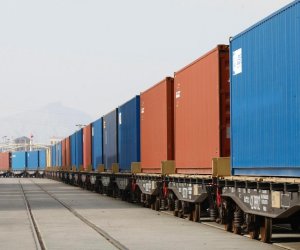
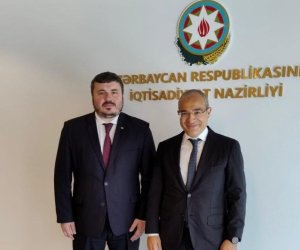

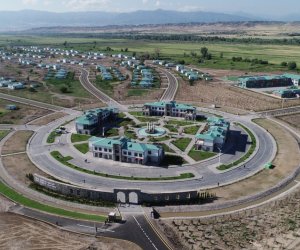
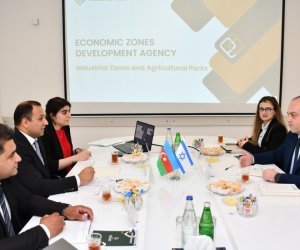
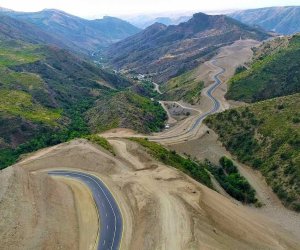
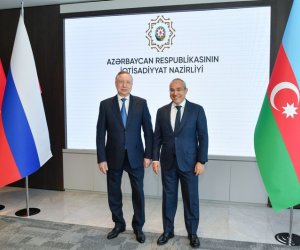
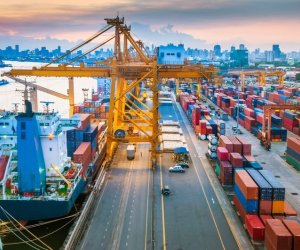
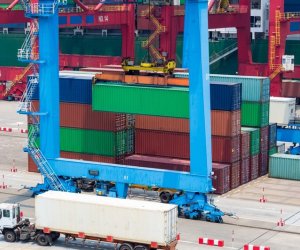



 Photo
Photo 



 Video
Video 

